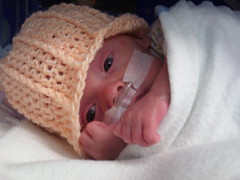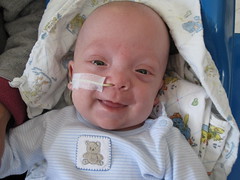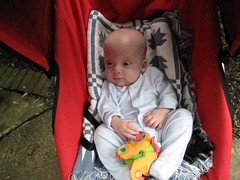Carolyn took Max to Children's hospital today for another CT scan and evaluation by the ebullient neurosurgeon B. At our last visit, a month ago, B noted that Max's ventricles (the brain's internal reservoirs of fluid) had swollen since his first visit. B, whose motto is "let's bet on Max", seesawed about whether to recommend a shunt; in fact, he has a disconcerting habit of debating himself, giving the impression that one is speaking to two doctors: Optimist B ("His ventricles aren't that much bigger") and Pessimist B ("But some younger docs would say, why wait? He's headed in the wrong direction, let's tap him now"). Optimist B: "I say, let's use the best gauge of intracranial pressure, the fontanel". Pessimist B: "But that's not very scientific", etc. Optimist B has always won out so far in our visits.
Indeed, at our last visit, B gave Max four weeks to get his act together. Just two weeks after that, we had a scare when Max's fontanel filled up and he showed a few signs of increased intracranial pressure (ICP). His head circumference had also clearly grown. So Carolyn and I fully expected B to recommend a shunt today, ending Max's long flirtation with hydrocephalus.
As part of Max's evaluation today he had another CT scan. This allows B to compare pictures of Max's brain across time, tracking the swelling of his ventricles. Today, Pessimist B said that maybe, if one squinted, one could make the case that Max's ventricles had grown slightly since his last appointment. This was a pretty weak argument and Optimist B won the day, saying that Max's ventricles were essentially unchanged.
So it was that B again decided that Max was still not (yet) a candidate for a shunt. B plotted Max's head circumference and, although Max is far above the 97.5th percentile, the trajectory looks concave. (Of course, with only three points, the only other two possibilities were linear or convex up.) Today, B gave Max two months before his next evaluation and, at his next appointment, Max won't have to get a CT scan unless he's showing symptoms of ICP. B likes to spare kids the radiation of a CT if possible.
B's decision was based in part on the fact that Max's head circumference growth appeared to be moderating but also simply by Max's clinical presentation. Max's appointment was scheduled on top of his normal morning nap time, so was asleep and kind of groggy when B examined him, but then he perked up and put on his usual display of charm. As B said, "I've seen kids with ICP and this isn't ICP". Even Pessimist B didn't contradict this.
Carolyn asked about the ICP scare we had a couple of weeks ago. B said that everyone's pressure normally fluctuates. He then speculated that Max might have a...and here he stopped talking and made kind of an up-and-down motion with his hand, indicating, presumably, a kind of a cyclical pressure inside his head. In this case, Max might not need a shunt.
In response, Carolyn asked whether fluctuations in pressure might be related to stress or lack of sleep (it's possible that she wasn't thinking of Max here, although he's had his share of both). B paused and then said "that would make a really great research paper." This response leads me to wonder if Pessimist B isn't a kind of internal journal editor, always issuing cautions.
Although B's clinical assessment of Max was extremely sanguine, Carolyn pointed out that all other specialists like to "blame the head"; that is, ascribe Max's reflux/feeding problems/weakness/CP/choose one on his hydrocephalus. This has been an ongoing theme of Max's care, dating all the way back to a now-hilarious episode in November. Indeed, during Carolyn's recent visit to the GI clinic, the GI team said that they'd seen infant eating improve after getting a shunt.
This question caused B to become extremely animated and to issue an almost categorical denial that Max is suffering from increased or abnormal ICP.
In the end, Max again managed to elude the grasp of the neurosurgeons. From what I've been able to dig up, this kind of prolonged uncertainty is unusual. Either kids' heads expand dramatically, or their growth slows sharply, often allowing the rest of the body to catch up. When I saw Max's old friends from the Georgetown NICU yesterday, the only clinical issue they brought up was Max's head. Long after he's over his reflux and eating problems, the resolution of his hydrocephalus will be with him. Ever since we brought Max home his physical presence has been so all-consuming that I haven't had the time or energy to obsess over his hydrocephalus.
skip to main |
skip to sidebar

Max was born in October 2008 at Georgetown University Hospital. After more than four months at GUH, Max moved to the HSC Pediatric Center in March 2009. He came home six months after he was born, in April 2009.
A TUBE-FREE MORNING

Start Here: A list of posts with background information
- We're home! (leaving the hospital with Max)
- The hospital at home (what it's like to care for Max at home)
- Max in action (see Max do his tricks)
- How is Max? (update April 2009)



